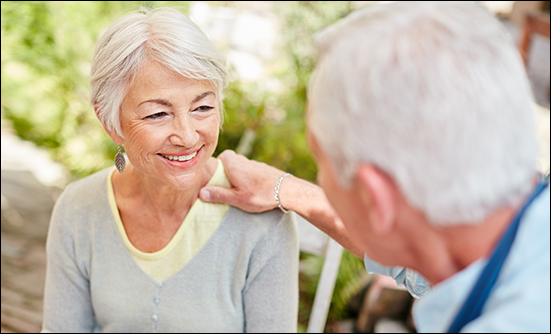When a cancer diagnosis is given, many challenges arise for patients and their families or caregivers. One of the many challenges is role reversal. Men who have a partner who is diagnosed with cancer may have a change in their role. This is a difficult time, and they may not be sure how to react.
According to Gary L. Patton, PhD, an Oncology Counselor at St. Mary’s Regional Cancer Center in Huntington, West Virginia, men who are ill or whose loved one becomes ill often don’t know what to do with the situation, so they do nothing, which can create problems.
Navigators should recognize the role and stressors of caregivers, and assist the caregiver with the development of coping skills. When the caregiver is a man, this can be particularly important.
Men Versus Women
Men respond to a cancer diagnosis in a different way from women. Men are most often engaged by tasks, whereas women are engaged by process. Women are known more as caregivers than men. When the roles are reversed, it creates a challenge for men. However, when a man’s wife or partner has cancer, he may become the caregiver.
Some men are uncomfortable with driving their partner to appointments, helping them with personal hygiene, doing the cooking, cleaning, laundry, and other tasks their partner was doing previously. Navigators can provide resources for caregivers and empower them in their new responsibilities.
When a loved one is diagnosed, male caregivers tend to go into the protector versus the defender role. Men tend to feel frustrated and helpless when facing diseases in their loved ones. It can be very hard for a man to know that he cannot “just fix this.”
Shutting Down Emotionally
Another challenge men face when the roles are reversed is how to provide their partner with the emotional support they need. Male caregivers often shut down emotionally, which is one of the hardest things for their significant other when they need support.
According to Dr. Patton, for men, not knowing the answer to a problem can be seen as a weakness. He teaches men to ask their loved ones what they need.
It may be hard for a man to discuss his emotions. Communication plays a key role in a cancer diagnosis, whether it is communicating with their partner, family, friends, or healthcare professionals. Spouses and other family members need support in dealing with the stresses of being a caregiver.
Dealing With Stress
Caregivers of patients with cancer experience high levels of distress and fear of cancer recurrence and are at increased risk for developing post-traumatic stress disorder. Caregivers often have concerns regarding relationship conflicts, personal needs, the need for psychological care, and the desire for contact with self-help groups. Stressors for male caregivers often involve:
– Feelings of helplessness
– Fear of the cancer diagnosis, and the possibility of a terminal illness
– The effects of the illness on employment
– The ability to perform family functions, including communicating and caring for children
– Concerns about the family’s future
There are many resources and support programs to help caregivers with challenges that come with a cancer diagnosis. Be sure to ask the navigator at your local cancer center for resources. The resources provided below can be helpful for many caregivers.
Read this article by Conquer Magazine in The Clearity Portal by clicking here.


